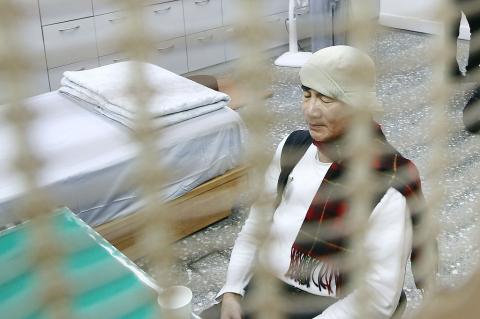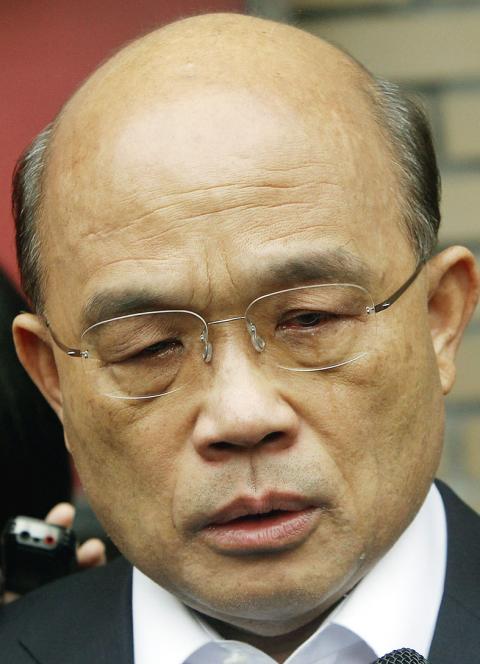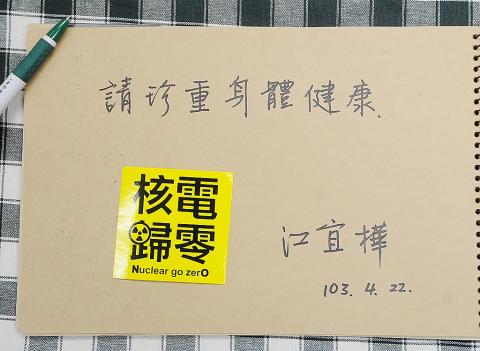Former Democratic Progressive Party (DPP) chairman Lin I-hsiung (林義雄) yesterday began a hunger strike at Taipei’s Gikong Presbyterian Church to demand that the government halt the construction of the Fourth Nuclear Power Plant in New Taipei City’s Gongliao District (貢寮), saying that the President Ma Ying-jeou (馬英九) administration’s pledge that the plant would be safe was “a trick to fool the public.”
“So-called nuclear safety is questionable because even if the plant was completed and became operational, unassailable damage could still take place in the event of a natural disaster or human error,” Lin said.
“My mind is at peace because I’m about to do something meaningful and helpful for Taiwan,” the 73-year-old said after arriving at the church at 10:55am, about an hour later than scheduled.

Photo: CNA
Lin, who announced his fasting campaign last week, is staging the hunger strike at the site of the Lin family’s former residence, where his mother and twin daughters were murdered on Feb. 28, 1980, by an unknown assailant. His eldest daughter, then nine years old, survived the attack and the Lin home was eventually converted into a church.
Lin — a well-known anti-nuclear advocate — said he appreciated his wife and daughter supporting him, despite knowing that they are doing so with “a heavy heart.”
After delivering an opening statement and conducting a 20-minute question-and-answer session with the media, Lin attended a brief prayer ceremony with friends before entering a renovated corner of the church that used to be the living room of his family residence to start the hunger strike.

Photo: Fang Pin-chao, Taipei Times
The staunch anti-nuclear advocate has vowed to neither eat, speak to nor meet visitors during his indefinite one-man protest.
Asked if he would end the hunger strike if the DPP-proposed special statute on the incomplete Gongliao station — which would lower the national referendum threshold to a simple majority and set a clear question for a plebiscite on completing the plant — was adopted, Lin said he would welcome such a development, but “it has not happened yet.”
Lin’s protest is drawing increasing attention from political figures, with DPP Chairman Su Tseng-chang (蘇貞昌) and Premier Jiang Yi-huah (江宜樺) both visiting the church.

Photo: Fang Pin-chao, Taipei Times
Su and Jiang’s visits came a day after they met on Monday to discuss the statute, but failed to reach a consensus, with the premier saying the plan was unfeasible.
Su arrived at the church at 12pm and wrote a message in a notebook prepared by church staff, saying afterward that he had been “racing against time” to resolve the issue so Lin’s hunger strike would be unnecessary, but had failed to reach an accord with the government.
“I’m not sure how many days Mr Lin will be able to sustain [the hunger strike.] After four decades of struggle [with the nuclear issue], what more can we do?” Su said as tears fell on his cheeks.
Jiang arrived about 10 minutes later to loud protests from Lin’s supporters outside the church, who chanted: “Jiang Yi-huah step down” and “Stop the construction of the Fourth Nuclear Power Plant,” and was again heckled when he left.
The premier also wrote a message to Lin in the notebook, saying: “Please take care of your health,” before leaving quickly without speaking to the media.
The Executive Yuan’s information office said Jiang was representing Ma on the visit to express the president’s concern about Lin’s health.
Given Lin’s age, his health could be at risk just two days into the fast, said National Taiwan University physician Ko Wen-je (柯文哲), who is also an independent aspirant in the Taipei mayoral election.
Former DPP chairperson Tsai Ing-wen (蔡英文) also visited Lin, arriving at the church in the afternoon and reiterating on Facebook the party’s determination to stop the construction of the Gongliao plant.
Former president Lee Teng-hui (李登輝) — a supporter of nuclear energy — yesterday said he was saddened by Lin’s protest, urging the Ma administration to “listen to the public” and work on new nuclear technology to erase people’s doubts about the project’s safety.
The Chilin Foundation, founded by Lin, and the Taiwan Rangers have organized events near the church every night starting yesterday as vigils for him. Similar activities are also planned in Taoyuan, Greater Taichung, Chiayi, Greater Tainan and Greater Kaohsiung.

NATIONAL SECURITY THREAT: An official said that Guan Guan’s comments had gone beyond the threshold of free speech, as she advocated for the destruction of the ROC China-born media influencer Guan Guan’s (關關) residency permit has been revoked for repeatedly posting pro-China content that threatens national security, the National Immigration Agency said yesterday. Guan Guan has said many controversial things in her videos posted to Douyin (抖音), including “the red flag will soon be painted all over Taiwan” and “Taiwan is an inseparable part of China,” while expressing hope for expedited “reunification.” The agency received multiple reports alleging that Guan Guan had advocated for armed reunification last year. After investigating, the agency last month issued a notice requiring her to appear and account for her actions. Guan Guan appeared as required,

A strong cold air mass is expected to arrive tonight, bringing a change in weather and a drop in temperature, the Central Weather Administration (CWA) said. The coldest time would be early on Thursday morning, with temperatures in some areas dipping as low as 8°C, it said. Daytime highs yesterday were 22°C to 24°C in northern and eastern Taiwan, and about 25°C to 28°C in the central and southern regions, it said. However, nighttime lows would dip to about 15°C to 16°C in central and northern Taiwan as well as the northeast, and 17°C to 19°C elsewhere, it said. Tropical Storm Nokaen, currently

‘NATO-PLUS’: ‘Our strategic partners in the Indo-Pacific are facing increasing aggression by the Chinese Communist Party,’ US Representative Rob Wittman said The US House of Representatives on Monday released its version of the Consolidated Appropriations Act, which includes US$1.15 billion to support security cooperation with Taiwan. The omnibus act, covering US$1.2 trillion of spending, allocates US$1 billion for the Taiwan Security Cooperation Initiative, as well as US$150 million for the replacement of defense articles and reimbursement of defense services provided to Taiwan. The fund allocations were based on the US National Defense Authorization Act for fiscal 2026 that was passed by the US Congress last month and authorized up to US$1 billion to the US Defense Security Cooperation Agency in support of the

PAPERS, PLEASE: The gang exploited the high value of the passports, selling them at inflated prices to Chinese buyers, who would treat them as ‘invisibility cloaks’ The Yilan District Court has handed four members of a syndicate prison terms ranging from one year and two months to two years and two months for their involvement in a scheme to purchase Taiwanese passports and resell them abroad at a massive markup. A Chinese human smuggling syndicate purchased Taiwanese passports through local criminal networks, exploiting the passports’ visa-free travel privileges to turn a profit of more than 20 times the original price, the court said. Such criminal organizations enable people to impersonate Taiwanese when entering and exiting Taiwan and other countries, undermining social order and the credibility of the nation’s